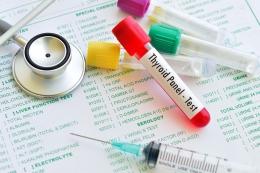Benefits of Thyroid Supplements for Hypothyroidism
Are you experiencing weight gain, constant fatigue, and cold intolerance? You might have a condition of low thyroid hormones. This condition is also known as Hypothyroidism.
Hypothyroidism is the result of the low production of the thyroid hormone in the body. The Thyroid hormones are responsible for the process of metabolism. Less thyroid hormone in the body may translate to a means a slower metabolism. Thus, people with this condition may experience the following signs and symptoms:
- Muscle weakness and fatigue
- Muscle and joint pain
- Thinner hair
- Constipation
- Dry skin
- Increased cold intolerance
- Weight gain
- Swelling of the face
- Irregular menstrual flow
- Bradycardia (the heart rate that is below normal)
- Altered memory
- Anxiety and depression
Generally, on the onset of Hypothyroidism, a person recognizes signs of weight gain and tiredness. These signs and symptoms do not manifest all at once. It still depends on the severity of a person’s thyroid problem.
Are You at Risk of Hypothyroidism?
Hypothyroidism can be diagnosed primarily based on the presented predisposing factors. You can evaluate your present health condition based on the following risk factors:
- Age and sex (common among women age 60 and above)
- Autoimmune disease in familial history
- Diagnosed with an autoimmune disorder such as Diabetes Type 1
- Undergone thyroid surgery
- Intake antithyroid medication
- Prolonged exposure to radiation
- Consumed a large amount of iodine
It is advisable to get thyroid screening and early diagnosis if these health factors apply to you. Undetected and poorly treated Hypothyroidism can lead to fatal complications.
How Is Hypothyroidism Diagnosed?
Endocrinologists are the specialists responsible for detecting and treating Hypothyroidism. It is always the best to get a consultation if you have concerns about your health. Aside from the factors mentioned above, the endocrinologist will request series of test such as the following:
- TSH Testing (Thyroid Stimulating hormone test)
This is done by conducting a blood test. In Hypothyroidism the expected results are low levels of T3 and T4.
- T4 Testing
The level of TSH alone does not confirm that you have Hypothyroidism. If the presented signs and symptoms still point to Hypothyroidism, testing free T4 is required. There are cases of normal TSH but low level of T4. It signifies that a person has the condition.
- Anti-thyroid Microsomal Antibodies Testing (Anti-TPO)
This blood test is done to determine the presence of Anti-TPO. This type of antibodies destroys thyroid cells resulting in low thyroid hormone count.
Do not hesitate to discuss options for diagnosing with your health care provider if you think you have Hypothyroidism. This will determine the right treatment to be prescribed.
How Is Hypothyroidism Treated?
The primary goal of the treatment of Hypothyroidism is to regulate the level of T3 and T4 in the bloodstream. Physicians prescribe a thyroid hormone pill that is to be taken daily. It is important to discuss food and other drug interaction while taking medication. A regular blood test is also done to monitor TSH levels.
Another treatment for Hypothyroidism is the intake of Thyroid supplements. A lot of people turn to this type of treatment as it is deemed safer. For this reason, it is also acquiring popularity across the globe. The following are some thyroid supplements and their health benefits:
- Selenium
A study about thyroid treatment and pathology published in 2017 indicated that Selenium plays a major role in thyroid hormone production. The study concluded that intake of Selenium as the supplement could contribute to thyroid disease prevention and health maintenance.
- Vitamin B-Complex
In autoimmune diseases like Hypothyroidism, it is important to take Vitamin B-Complex. It boosts the immune system and aids in normal body metabolism. Susceptibility to diseases and slow metabolism are associated with Hypothyroidism.
- Zinc
Zinc is one of the primary elements needed for the conversion of T3 and T4. It also helps in treating Hypothyroidism by improving immune system function and reducing oxidative stress.
- Iron
Low iron in the blood can exacerbate the complications of Hypothyroidism. It is important to take iron supplements to help increase thyroid hormone production.
- Probiotics
Probiotics are responsible for increased stomach acid. It speeds up metabolism. Hypothyroidism is associated with gain and slow metabolism. Thus, taking probiotics is recommended.
- Iodine
Iodine also plays a major role in the production and activation of thyroid hormones. It means that low Iodine results in low thyroid hormone count. Taking iodine-enriched supplements helps regulate thyroid hormone level.
- Proteolytic enzymes
Its function is almost similar to probiotics. It also helps in food medicine absorption. As a result, any medication taken along with proteolytic enzymes is absorbed fast.
- Fish oil
The intake of fish oil can be associated with Omega- 3 fatty acids. It improves the production of thyroid hormone and metabolism.
Aside from the above-mentioned supplements, modifying your diet and lifestyle into a healthy one is also recommended. It is important to recognize the foods that limit and aid in the production of thyroid hormone. Thyromate, our thyroid support supplement, can help in this regard.













































































Leave a comment